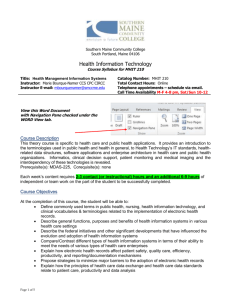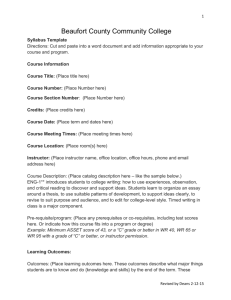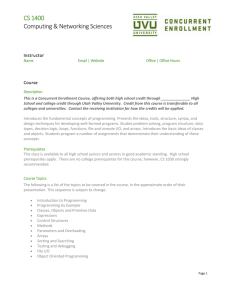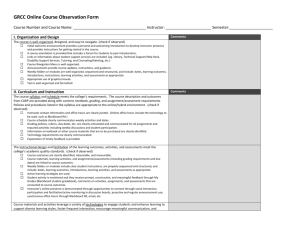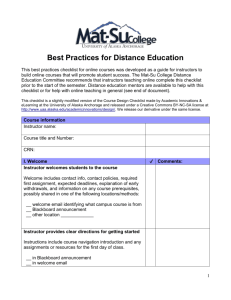Southern Maine Community College
advertisement
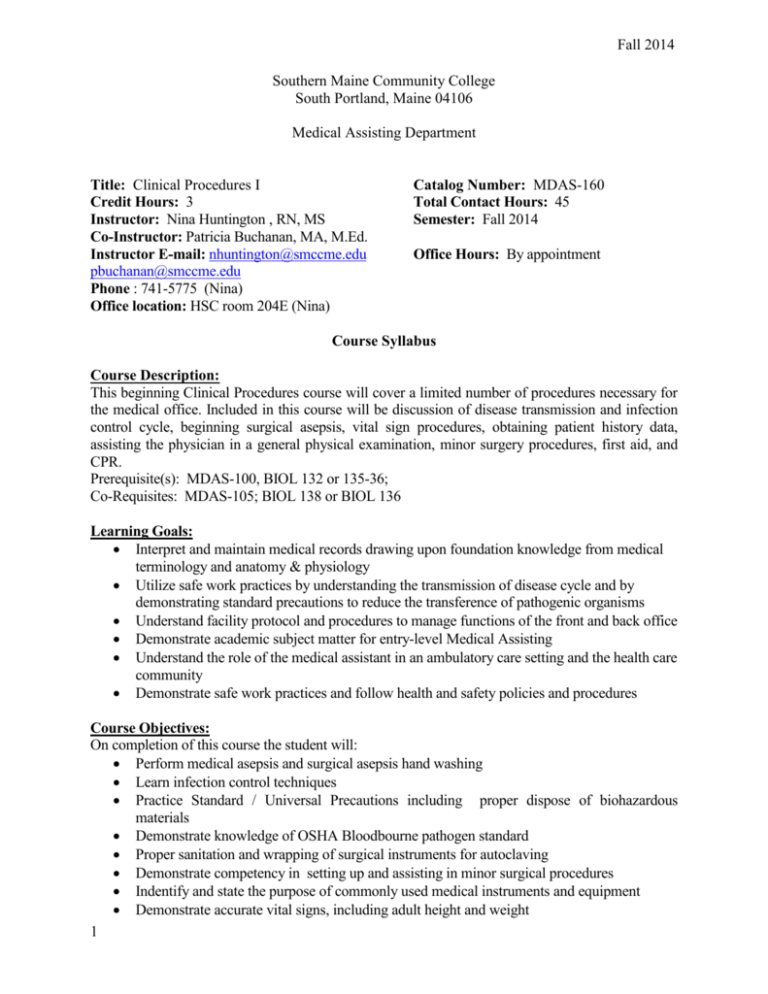
Fall 2014
Southern Maine Community College
South Portland, Maine 04106
Medical Assisting Department
Title: Clinical Procedures I
Credit Hours: 3
Instructor: Nina Huntington , RN, MS
Co-Instructor: Patricia Buchanan, MA, M.Ed.
Instructor E-mail: nhuntington@smccme.edu
pbuchanan@smccme.edu
Phone : 741-5775 (Nina)
Office location: HSC room 204E (Nina)
Catalog Number: MDAS-160
Total Contact Hours: 45
Semester: Fall 2014
Office Hours: By appointment
Course Syllabus
Course Description:
This beginning Clinical Procedures course will cover a limited number of procedures necessary for
the medical office. Included in this course will be discussion of disease transmission and infection
control cycle, beginning surgical asepsis, vital sign procedures, obtaining patient history data,
assisting the physician in a general physical examination, minor surgery procedures, first aid, and
CPR.
Prerequisite(s): MDAS-100, BIOL 132 or 135-36;
Co-Requisites: MDAS-105; BIOL 138 or BIOL 136
Learning Goals:
Interpret and maintain medical records drawing upon foundation knowledge from medical
terminology and anatomy & physiology
Utilize safe work practices by understanding the transmission of disease cycle and by
demonstrating standard precautions to reduce the transference of pathogenic organisms
Understand facility protocol and procedures to manage functions of the front and back office
Demonstrate academic subject matter for entry-level Medical Assisting
Understand the role of the medical assistant in an ambulatory care setting and the health care
community
Demonstrate safe work practices and follow health and safety policies and procedures
Course Objectives:
On completion of this course the student will:
Perform medical asepsis and surgical asepsis hand washing
Learn infection control techniques
Practice Standard / Universal Precautions including proper dispose of biohazardous
materials
Demonstrate knowledge of OSHA Bloodbourne pathogen standard
Proper sanitation and wrapping of surgical instruments for autoclaving
Demonstrate competency in setting up and assisting in minor surgical procedures
Indentify and state the purpose of commonly used medical instruments and equipment
Demonstrate accurate vital signs, including adult height and weight
1
Fall 2014
Learn to take a proper patient history-interviewing a patient for present illness/chief
compliant
Learn how to assist with medical specialty testing
Identify components and proper usage of the medical record
Set up and assist the physician with procedures related to the physical examination.
Maintain confidentiality
Learn proper documentation of clinical lab skills
Outside work and hours: The expectation is you spend 2 hours per semester credit- this is a 3
credit course- so 6 hours per week or a total of 96 hours for the 16 week semester. This time should
be spent on the following:
Reading/studying
Homework
Assessments- testing
Research
Project
All other relevant assignments
Teaching Procedures:
Lecture / Discussion
Audiovisual Materials
Clinical demonstration(s)
E-mail Communication
Reading assignments
Special Class Discussions
Discussion board- via Blackboard
Homework/Quizzes/Exams ( in-class-timed-online via Blackboard or take-home format)
Course Outline:
WEDNESDAYS
& FRIDAYS
READING
ASSIGNMENTS
IN CLASS
9:00-10:50
AM
Week 1
Wednesday,
August 27th
Friday,
August 29th
Lecture: Chapter 22: Infection Read chapter 22
Control
Cont. Chapter
ControlLecture-labs
22:
Infection
Week 2
Wednesday,
Cont. Chapter
Control-labs
22:
Infection
2
HOMEWORK/EXAMS
DATES
REFLECT
WHEN EXAMS ETC.
WILL BE AVAILABLE
VIA BLACKBOARD
Homework chapter
22-
Fall 2014
September 3rd
Friday,
September 5th
Blood Borne Pathogens Training / Read Chapter 24
Certificate Videos & quiz
Test # 1 : Chapter
22-in-class
Blood-Bourne
pathogen DVDs
series and quiz (inclass) -
Week 3
Wednesday,
September
10th
Friday,
September
12th
Week 4
Wednesday,
September
17th
Chapter 24: Vital Signs: lecture
Continue with chapter 24-lecture
&labs
Continue with chapter 24-labs
Take home Quiz :
chapter 24
Read
Chapter 23
V/S challenge
collected
Friday,
September
19th
Chapter 23: Patient History and
Documentation –lecture
Week 5
Wednesday,
September
24th
Continue chapter 23Patient interviews- sim lab
Friday,
September
26th
Continue chapter 23
Patient interviews- sim lab
Open lab for V/S
Open lab for V/S
Week 6
Wednesday,
October 1st
Peer assessments and review of Read
patient sim lab interviews
Chapter 31
Friday,
October 3rd
Lecture: Chapter 31 : Assisting
with Minor Office/ Ambulatory
3
Test # 2 : Chapter
24 –online-timed
Test #3 : Chapter 23
Part I: take- home
format :
a) Patient medical
history
b) Sim lab
documentation
Part II- online
timed
Fall 2014
Surgery
Week 7
Wednesday,
October 8th
Friday,
October 10th
Continue chapter 31 labs
Week 8
Wednesday,
October 15th
Chapter 25: The Physical Examlecture
Continue chapter 31 labs
Read
Chapter 25
Test # 4: Chapter
31- online-timed
V/S challenge
collected
Friday,
October 17th
Chapter 25 – labs
Week 9
Wednesday,
October 22nd
Chapter 30 : Examinations &
Procedures of Body Systems lecture
Friday,
October 24th
Week 10
Wednesday,
October 29th
Continue with chapter 30-lecturelabs
Continue with chapter 30-lecturelabs
Friday ,
October 31st
Continue with chapter 30-lecturelabs
Read chapter 30
Continue with chapter 30-lecture- Read chapter 32
Week 11
Wednesday,
labs
November 5th
Friday,
Chapter 32: Diagnostic Imaging
Read chapter 38
November 7th
Test # 5: chapter 25online-timed
Test # 6: chapter 30
–take home testPart I
Part II- onlinetimed
Test # 7: chapter 32
–online-timed
Project Due-due
November 7, 2014 –
in class or via emailby midnight
Week 12
Wednesday,
November
4
Chapter 38: Safety and Regulatory Read chapter 39
Guidelines
in
the
Medical
Laboratory-lecture only ( no labs)
Fall 2014
12th
Friday,
November
14th
Week 13
Wednesday,
November
19th
Chapter 39: Introduction
Medical Laboratory-lecture
to
Continue chapter 39-lecture & labs
Read chapter 43
Friday,
November
21st
Week 14
Wednesday,
November
26th
Chapter 43: Basic Microbiology lecture
Friday,
November
28th
Week 15
Wednesday,
December 3rd
No classes- college closed
Friday,
December 5th
Week
16Finals
Wednesday,
December
10th
Friday,
December
12th
Practice for lab final –
Patient interviews
Final clinical lab exam : pass/ fail
Study for clinical
lab final
Must pass with
80%
Final clinical lab exam : pass/ fail
Must pass with
80%
Continue chapter 43-lecture & labs
Test # 9: chapter 43
–online-timed
Read chapter 48
Chapter 41: Hematology lecture &
labs
Test # 10- chapter
41 – online-timed
Student Evaluation and Grading
Tests / quizzes
Final Clinical Lab
Documentation-skill labs/
discussion board
Vital Sign challenge
Project
Attendance/participation
Grading System:
5
homework
Test # 8:
Chapters 38 & 39online-timed
40%
15%
/ 15%
10%
15%
5%
V/S challenge
collected
Fall 2014
4.00 grade points per credit hour (100-94%)
A3.67 grade points per credit hour (93-90%)
B+
3.33 grade points per credit hour (89-87%)
B
3.00 grade points per credit hour (86-83%)
B2.67 grade points per credit hour (82-80%)
C+
2.33 grade points per credit hour (79-77%)
C
2.00 grade points per credit hour (76-73%)
C1.67 grade points per credit hour (72-70%)
D+
1.22 grade points per credit hour (69-67%)
D
1.00 grade points per credit hour (66-60%)
F
0.00 grade points per credit hour
Required Text and Supplies:
Delmar’s Comprehensive Medical Assisting, 2010, 4th or 5th edition; Lindh, W., Pooler, M.
Tamparo, C. & Dahl, B.
Delmar’s Comprehensive Medical Assisting Student Workbook: 4th or 5th edition Lindh,
W., Pooler, M. , Tamparo, C. & Dahl, B. –optional purchase
Watch with 2nd hand –to count seconds
Stethoscope
1” 3 ring binder
Students must complete this course with a C /73% or better. Students will be tested using
written exams, assignments and by the performance of laboratory skills.
Course Expectations
1. Blackboard will have announcements for all assignments , quizzes or tests –
blackboard will identify all due dates ( not the syllabus)
2. Blackboard grade book is a running total and should not be considered the
official grade
3. All assignments are due by midnight of the deadline date- a late assignment will
automatically receive a zero
4. You must complete documentation for all clinical labs- all documentation will be
emailed- pbuchanan@smccmee.edu or if instructed to nhuntington@smccme.edu
5. If you miss a lab- you need to schedule a make-up with an instructor- plan on
making up lab after next scheduled class
6. No open-toe shoes in lab
7. On an assignment- if you directly quote an author- you must:
a) Cite your author- directly in the body of the paper etc.
b) Follow the quote with your interpretation – in other words, why did
you use the quote- explain the relevance or context of using the quote:
i.e. “When delivering or assisting in delivering emergency care, the medical assistant
may be concerned about professional liability.” (Lindh, et al, 2014, p. 161)
6
Fall 2014
i.e. Bloodbourne pathogens are pathogenic microorganisms that are present in human blood and
can cause disease in humans. Health Wide Hazards- lack of universal precautions
(https://www.osha.gov/SLTC/etools/hospital/hazards/univprec/univ.html- this website
should be also listed in your works cited sections – proceeding the title of the website
Lindh, Pooler, Tamparo, & Dahl -Delmar’s Comprehensive Medical Assisting-5th ( or
4th) edition- (2010) Delmar Cengage Learning – Clifton Park, New York –proper APA
format
Note: copyright for 4th edition is 2010 and 5th edition is 2014
8. It is your responsibility to frequently check your SMCC email and blackboard (for
announcements )
Clinical skills lab competencies: skills performed in the skills lab will be evaluated for
competency, using a skill competency check list {denote with * at the end of this syllabus}
These checklists are found either in the blackboard chapter folder- or in a notebook in the MA lab.
Clinical Skills Lab practical final: must be passed with a score of 80% or above; anything
lower than an 80% will be deemed a Failed Attempt. A student will get the opportunity to
repeat the clinical skill final at the discretion of the instructors
Students MUST pass all laboratory skills testing in order to continue in the program. If a student
fails to pass a laboratory skills test after the second attempt, s/he will receive an “F” for MDAS160 and will be required to repeat the course.
Exams:
Tests/ quizzes will be posted on blackboard- all tests are online-timed unless specified by
instructor.
All tests-quizzes must be completed by midnight-due date –failure to complete testquizzes by its deadline will automatically resulted in a zero for a grade
If you encounter a technical problem in blackboard immediately email instructor -nhuntington@smccme.edu- Please note that in order for you to retake the test – instructor
will have delete any answers completed and you will need to retake the entire test
Blackboard will have dates of when a test is available- as well as to when it is due ( not
included in the syllabus) – there will be an announcement in class- as well as
announcement in blackboard
The highest grade that can be earned any assignment, quiz, paper, or test is 100%
Misspelled words, terms etc. will results in point reduction, regardless if you got the
answer correct
The instructor will manually grade all tests –quizzes in blackboard- final grade for each
test or quiz will be recorded in blackboard grade book
Written Assignments:
7
Fall 2014
Written assignments must be submitted on or before the due date. It is understood that in the
event of school closing due to snow, etc. the assignment is due the next class day.
All written graded homework/ assignments are expected to be typed. Students will submit all
typed assignments in a Microsoft Office format (e.g. Word, Excel, and Publisher). If a student
submits an assignment in a format other than what is listed and it cannot be opened by the
instructor. The instructor does have the option to consider the assignment late until it is
submitted in the appropriate format. All assignments must be submitted through e-mail. Late
assignments will automatically result in a zero.
The instructor reserves the right to alter the syllabus, exams, assignments, homework to
meet the learning outcomes/objectives set forth by the Medical Assisting Department and
the National Accrediting body within reason.
Attendance Policy- Classes on Campus
1.
If course only meets twice a week, students are allowed two (2) absences per course per
semester and if course only meets one (1) time per week, student is allowed one (1)
absence per course per semester.). For each subsequent absence, the student’s grade
will drop a whole letter—i.e. for a student has a B or 83% average- their grade will
automatically drop to a 73. An excused absence still requires the student making up
any work or labs you have missed.
2.
Exceptions to the above are illness documented by a note from a physician or death in the
immediate family. These would constitute a written or faxed excused absence.
3.
Per school policy, if a student misses 3 consecutive classes s/he will be withdrawn from
the course unless student has been in contact with instructor and made arrangements.
Three consecutives absences results in a grade of AF (Administrative Failure).
4. If a student must miss a scheduled class time the expectation is that the instructor will be
notified before the beginning of the class. If this is not possible, then the expectation is
that the instructor will be notified as soon as possible afterwards.
5. Student Lateness:
Any student more than ten (10) minutes late for class will be allowed to participate only
at the discretion of the instructor. An absence will be assigned for accumulation of two
(2) late warnings and apply towards Attendance Policy.
6. Student Leaving Class Early:
An absence will be assigned for accumulation of two (2) instances where a student leaves
class early and will be applied towards the Attendance Policy.
8
Fall 2014
Try to not schedule any appointments which necessitate you to have leave class or early or
arrive late
Professionalism: It is expected that you conduct yourself in the lab and the classroom as you
would in a medical office. Professional dress attitude and language is expected at all times.
Professionalism also includes punctuality, dependability and initiative. Be professionally
dressed and ready to possibly go into the lab days this course meets.
Code of Professionalism
student completes any assignment, test etc. on time
students send messages that are written professionally and respectful, with or concerns
questions - text message language is inappropriate in any form of professional
communication- i.e. email
student is ready to go- at the start of class
cell phones are off and not used during class
opinions that differ from your colleagues or instructors are encourage however, a
student will present their view diplomatically
Course Sequence:
Student MUST finish with a “C” 73% grade or better in all core courses prior to taking advanced
core courses or participating in the PRACTICUM. Student is expected to meet all pre-requisites
and take core courses in appropriate approved sequence.
Dismissal from the program may occur at any point in the semester, if a student violates safety
standards, fails to adhere to professional conduct, or fails to meet the requirements of a clinical
course or practicum warning, s/he will be dismissed from the Medical Assisting program.
CPR Certification
Student must show current proof of CPR at the Healthcare Professional Level prior to course
completion. American Heart Association CPR- Healthcare Provider will be offered during
MDAS-160 ( outside of class scheduled time) .
Communication:
All students will be expected to set up an email address, keep it current, and are responsible for
checking their email for announcements and other communication. Students will have access to
computers in SMCC computer labs and library. If the student does not maintain a valid e-mail,
9
Fall 2014
the student is still responsible for all missed information communicated. Students are expected to
regularly check the on-line course site utilized by the course for any pertinent information.
Snow Policy:
Staff and students should listen for specific SMCC announcements for class cancellations or
postponement on local TV and radio stations. The following should serve as a guide for Medical
Assisting Dept. students. Classes scheduled at SMCC will be held unless officially canceled as
per institutional policy. Class absences will be recorded as usual on storm days unless SMCC is
officially closed. If a class is cancelled it is expected the student check blackboard for any
assignments/information that are posted. The student is responsible for this information even if
the class day has been cancelled.
Academic Achievement Center:
The Academic Achievement Center is located next to the Library. They offer a wide range of
services that include study techniques, test taking techniques, math, and writing tutoring.
End-of-Course Evaluation:
In order to gain access to final course grades, students must complete evaluations for each course
attended at SMCC. Evaluations are submitted on-line and can be accessed through the student
portal site. Students can access the course evaluation report beginning two weeks before the end
of classes. The deadline for submission of evaluations occurs 24 hours after the last day of
classes each semester. Instructors will announce when the on-line course evaluation is available.
SMCC Student Printing Policy
Students can print 100 pages per semester for free. If you print over 100 pages, you will be
charged 10 cents per page to your Beacon Bucks account. Left-over pages will roll over to the
following semester but will zero out at the end of the academic year. A pilot project tracking
public printing has shown that this amount of free printing meets the needs of the vast majority
of students. The College’s pay-for-print system monitors printing on all public printers (i.e.,
those in general access labs, library printers, the LAC, and technology labs). Each time you log
in to the system, the print station displays the remaining print quota. Once the printing quota has
been exceeded, users will be charged $0.10 per page on their Beacon Bucks accounts. Color
printouts will be charged at 11-page units. This means each color printout will count as 11 pages
toward the quota and cost $1.10. Students can add money to their cards using a credit card online.
Academic Integrity:
Southern Maine Community College requires all students to adhere to high standards of integrity
in their academic work. Activities such as plagiarism and cheating are not acceptable and will
not be condoned by the College. Students involved in such activities are subject to serious
disciplinary action.
10
PLAGIARISM is defined as the use, whether by paraphrase, or direct quotation of a
work, published, or unpublished of another person’s ideas, words, statistics, or other
creative materials, without full or clear acknowledgement that the work belongs to that
other person.
CHEATING would include the giving or receiving of unauthorized assistance on
quizzes, examinations, and written assignments from any source not approved by the
instructor.
Fall 2014
STEALING, DESTROYING, or UNAUTHORIZED COPYING of another person’s
computer program of files, deliberately preventing another’s access to the college computer
system, or impeding the system’s performance in any way are also included in this policy.
Plagiarism Statement:
Adherence to ethical academic standards is obligatory. Cheating is a serious offense, whether it
consists of taking credit for work done by another person or doing work for which another
person will receive credit. Taking and using the ideas or writings of another person without
clearly and fully crediting the source in plagiarism and violates the academic code as well as the
Student Code of Conduct. If it is suspected that a student in any course in which s/he is enrolled
has knowingly committed such a violation, faculty member should refer the matter to the
College’s Disciplinary Officer and appropriate action will be taken under the Student Code of
Conduct. Sanctions may include suspension from the course and a failing grade in the course.
Students have the right to appeal these actions to the Disciplinary Committee under the terms
outlined in the Student code of Conduct.
Add-Drop Policy:
Students who drop a course during the one-week “add/drop” period in the fall and spring
semesters and the first three days of summer sessions receive a 100% refund of the tuition and
associated fees for that course. Please note any course that meets for less than the traditional
semester length, i.e., 15 weeks has a pro-rated add/drop period. There is no refund for non
attendance.
Withdrawal Policy:
A student may withdraw from a course only during the semester in which s/he is registered for
that course. The withdrawal period is the second through the twelfth week of the fall and spring
semesters and the second through the ninth week of twelve-week summer courses. This period is
pro-rated for shorter-length courses. To withdraw from a course, a student must complete and
submit the appropriate course withdrawal form, available at the Enrollment Service Center (no
phone calls please). The designation “w” will appear on the transcript after a student has
officially withdrawn. A course withdrawal is an uncompleted course and may adversely affect
financial aid eligibility. Failure to attend or ceasing to attend class does not constitute withdrawal
from the course. There is no refund associated with a withdrawal.
ADA Statement:
ADA (Americans with Disabilities Act):
Southern Maine Community College is an equal opportunity/affirmative action institution and employer.
For more information, please call 207-741-5798. If you have a disabling condition and wish to request
accommodations in order to have reasonable access to the programs and services offered by
SMCC, you must register with the Disability Services Coordinator, Sandra Lynham, who can be
reached at 741-5923. Further information about services for students with disabilities and the
accommodation process is available upon request at this number. Course policies about online testing
are modified to suit each individual’s accommodations.
MDAS 160
SKILLS LIST
* denotes student demonstration of competency
Chapter Skills listed
Procedure Cognitive
11
Psychomotor
Affective
Fall 2014
22
24
12
*Medical Asepsis
Hand Wash
#
22-1
Correct Use of
Alcohol-Based hand
rub (ABHR)
*Removing
Contaminated Gloves
Transmission- Based
Precautions: Donning
a gown, gloves and
mask (PPE)- Isolation
technique
Sanitization of
Instruments
*Measuring an Oral
Temperature –
electronic/digital
thermometer
22-2
*Measuring Aural
temperature-Tympanic
Thermometer (TY)
*Measuring a
temperature- Temporal
Artery (TA)
Thermometer
*Measuring a radial
pulse
*Measuring an Apical
Pulse
*Measuring –
respiration rate
*Measuring blood
pressure –
sphygmomanometer/
stethoscope - using
Systolic Palpation
Method (SPM)
*Measuring Height scale with measuring
bar
*Measuring Weight-
24-2
Comprehend
Applies
Illustrates
Awareness
Imitation
Practice
Habit/Mastery/
Valuing
Perception
Performs
Practices
Reproduce
Adapts
Comprehend
Applies
Illustrates
Awareness
Imitation
Practice
Habit/Mastery/
Valuing
Perception
Performs
Practices
Reproduce
Adapts
22-3
22-4
22-5
24-1
24-3
24-7
24-8
24-9
24-10
24-11
24-12
Fall 2014
23
31
13
balance-beam scale
*Proper
documentation of
parenteral or oral
medication
Taking a Patient
Medical History –
proper documentation
of form
Assessing Chief
Compliant- Present
Illness
Proper SOAPER
documentation
*Applying Sterile
Gloves
23-1
Describe
Comprehends
Analysis
Concludes
Comprehend
Applies
Illustrates
Reads
Reports
Awareness
Receiving
Perception
Assembles
Organizes
Willingness to
use active
listening
31-1
*Preparing
instruments for
autoclave
Sterilization of
Instruments
(Autoclave)
*Setting up and
Covering a Sterile
Field
*Opening Sterile
Packages of
Instruments and
Supplies and Applying
them –Sterile Field
*Pouring sterile
solutions into a sterile
cup- onto a sterile field
Assisting with
Office/Ambulatory
Surgery
Wound Irrigation
31-3
Preparation of
patient’s Skin before
31-11
31-4
31-5
31-6
31-7
31-8
31-10
Comprehend
Applies
Illustrates
Awareness
Imitation
Practice
Habit/Mastery/
Valuing
Perception
Performs
Practices
Reproduce
Adapts
Fall 2014
25
surgery
Suturing of laceration
of incision repair –
must create
physician’s
preference card
Sebaceous Cyst
Excision
Incision & Drainage of
Localized Infection
*Suture / Staple
removal
Application of sterile
adhesive closure strips
– Steri- Strips
Assisting with
physical exam
Supine-horizontal
position
Dorsal recumbent
position
Lithotomy position
Semi-Fowlers
position-45 degrees
14
31-12
31-13
31-14
31-17
31-18
25-1
5th-P.633Figure 256
4th- p. 603
Figure 255th-P.634Figure 257
4th- p. 603
Figure 251
5th-P.634Figure 258
4th- p. 603
Figure 251
5th--P.634Figure 259
4th- p. 604
Figure 251
Comprehend
Applies
Illustrates
Awareness
Imitation
Practice
Habit/Mastery/
Valuing
Perception
Performs
Practices
Reproduce
Adapts
Fall 2014
30
15
High Fowler’s position 5th-P.634Figure 2510
4th- p. 604
Figure 251
Prone position
5th--P.635Figure 2512
4th- p. 605
Figure 251
Sim’s or lateral
5th--P.635position
Figure 2513
4th- p. 605
Figure 251
Assisting with a
30-2
Neurologic Screening
Examination
*Performing Visual
Acuity Testing Using
a Snellen Chart
Measuring Visual
Acuity- Jaegar card
Testing colorblindness- Ishihara
Plates
30-3
Performing Eye
Instillation
30-6
Performing eye
irrigation
Performing Ear
irrigation
Performing ear
instillation
Assisting with Nasal
Examination
*Instructing Patient in
use of Metered-DoseInhaler use with spacer
30-8
30-4
30-5
30-9
30-11
30-12
30-16
Comprehend
Applies
Illustrates
Awareness
Imitation
Practice
Habit/Mastery/
Valuing
Perception
Performs
Practices
Reproduce
Adapts
Fall 2014
33
39
43
*Spirometry –Peak
Flow meter
*Pulse- Oximetry
(pulse-ox )
*Fecal Occult Blood
test
Urinary
Catheterization- male
Urinary Catherizationfemale
*Proper
documentation of
parenteral or oral
medication
Assisting patient to
ambulate with walker- Teaching patient to
ambulate with a
walker
30-18
30-21
30-22
30-23
33-5/
33-6
Teaching patient to
ambulate with crutches
Assisting patient to
ambulate with a cane
*Proper
documentation of
parenteral or oral
medication
Using the microscope 39-1
Describe
Comprehends
Analysis
Concludes
Comprehend
Applies
Illustrates
Describe
Comprehends
Analysis
Concludes
Comprehend
Applies
Illustrates
*Obtaining a Throat
CultureQuick Strep A
43-3
Comprehend
Applies
Illustrates
*Wet-Mount and
Hanging Drop Slide
Preparation
43-2
*Proper
documentation
of parenteral or
oral medication
Describe
Comprehends
Analysis
Concludes
*Proper
documentation of
parenteral or oral
medication
16
30-17
Reads
Reports
Awareness
Imitation
Practice
Habit/Mastery/
Valuing
Perception
Performs
Practices
Reproduce
Adapts
Reads
Reports
Awareness
Imitation
Practice
Habit/Mastery/
Valuing
Perception
Performs
Practices
Reproduce
Adapts
Awareness
Imitation
Practice
Habit/Mastery/
Valuing
Perception
Performs
Practices
Reproduce
Adapts
Describe
Comprehends
Analysis
Concludes
Reads
Reports
Fall 2014
41
Microhematocrit
Determination –
41-2
Comprehend
Applies
Illustrates
Awareness
Imitation
Practice
Habit/Mastery/
Valuing
Learning domains –Bloom’s Taxonomy of Learning Domains
www.nwlink.com/--donclark/hrd/bloom.html
Revised by Nina Huntington and Patricia Buchanan August 11, 2014
17
Perception
Performs
Practices
Reproduce
Adapts

